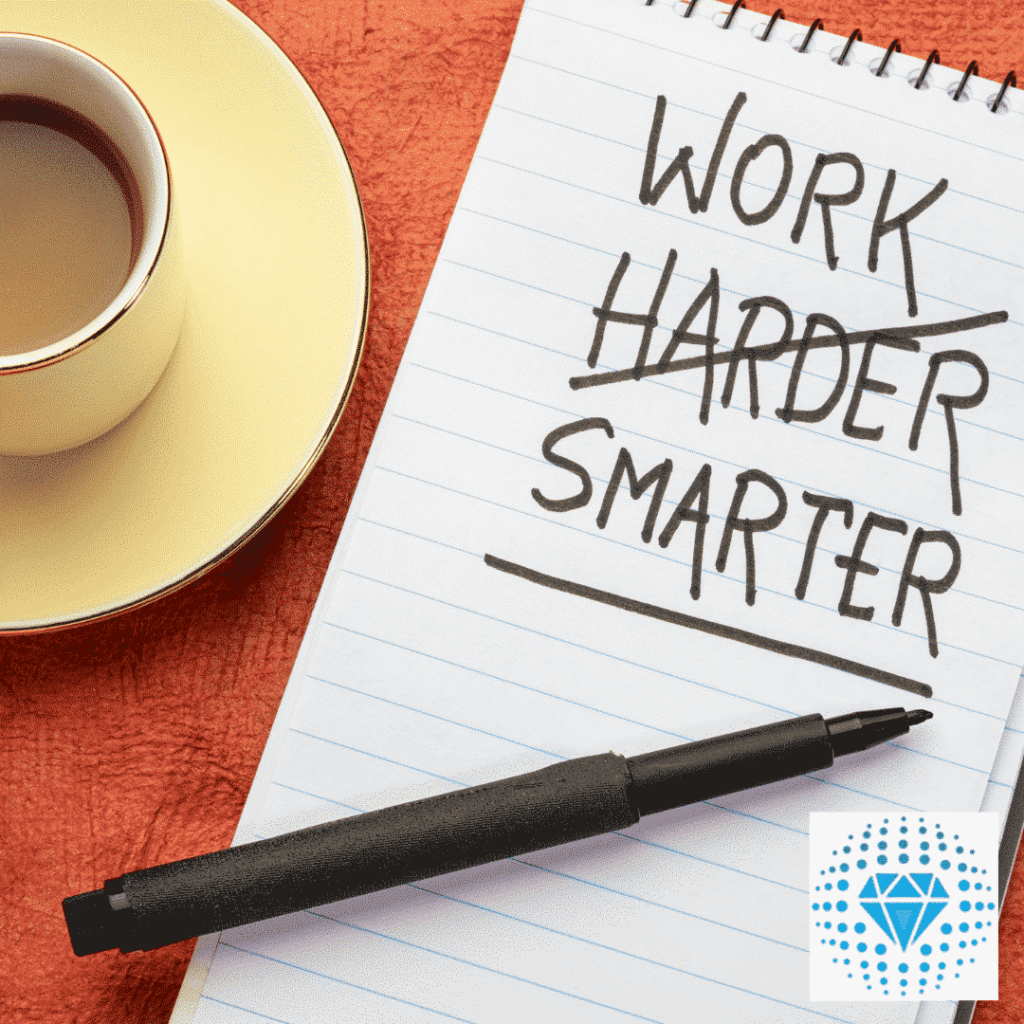Wondering how successful people work smarter, not harder? This sounds like a great proposition to someone as busy as me. But what does it actually mean? And, more importantly, how can I apply it in practice?
Essentially, we could all work as many hours as there are in the day. Regardless of our occupations, there is often more than enough work that could be done at any given point. But is this really the best strategy? And, will it actually get us to where we aspire to be?
With the aim to Thrive in your current line of work, I consider a number of different components below that contribute to working smarter rather than harder.

Is it Better to Work Harder or Smarter?
First and foremost, we need to understand what we’re aiming for. It’s essential to understand what our end goals look like and our definitions of success (or other). Are we aiming for promotion? To secure that bonus? To land our next role?
It can also be useful to consider this across multiple dimensions e.g. work and financial goals, work-life balance and health. Without this insight we could ultimately end up working blindly and, regardless of the number of hours we put in and the sacrifices we make, we’ll never fully make it.
“Begin with the end in mind” is Habit 2 of Stephen Covey’s classic 7 Habits of Highly Effective People. Essentially, if we define our end goal, it will give us the direction to aim for, the ability to ‘course correct’, if required, and to actually know when we get there! This is a key way how successful people work smarter, not harder.
What Does Working Smarter Mean?
SMART objectives
Many of us are familiar with the SMART mnemonic that’s used in objective setting. There are a couple of variations but I like Specific, Measurable, Achievable, Relevant and Time based. In theory this makes perfect sense, but how many of us actually use this in practice? Especially if we’re setting our own objectives.
Taking our broad goals from above and aligning smart objectives to these is critical to ensure we’re focused on doing the right things to get us there. This can also help in breaking goals down into an appropriate level of detail to make them actionable and achievable.

Why is Smarter Working Important?
Let’s not stop at creating goals and objectives. Once we know what we want to do, we need to decide what to focus on first. There are two things I find useful here:
Firstly, Stephen Covey’s Habit 3 “Putting First Things First”. In particular, the Importance/Urgency matrix helps me to categorise and prioritise tasks. We should focus on addressing the important tasks (above non-important ones) and ideally before they become urgent. This can serve as a great, yet simple, tool as and when new info and tasks crop up.
Secondly, “The One Thing” by Gary Keller and Jay Papasan. The key theme here is based on the question “What’s the ONE THING you can do such that by doing it everything else will be easier or unnecessary?”. This is repeated throughout the book and can be applied to different areas of your life.

Monitoring Your Work Habits
Once we know what we should be doing, it’s useful to establish ways that allow us to monitor progress against our objectives. They say “what gets measured gets done”. Monitoring can also give us early warning signs and allow us to course correct accordingly.
Monitoring could be an app or other tool that monitors progress automatically for us, or it could be as simple as a to-do list or sticker chart!
It’s time to ask ourselves some questions:
Firstly:
Am I doing what I said I’d do? If so, how’s that working for me? If not, why might that be? What could I do to move forward on this?
Secondly:
Is what I’m doing having the desired affect? If not, why is this? What else could I do as well / instead?
We’ll probably need some kind of data to answer all of these and it should be linked to the ‘measurable’ elements of our objectives above.
Boundaries in Life and Work
Boundaries can be a tough one. We may work for others and need to adhere to and respect their boundaries. Some things feel completely outside of our control – these could be in terms of working hours or company policies and processes – but there are always some elements within our control. It’s important that we understand and set some boundaries of our own for the components that are in our control:
Time – how much are we able / prepared to work in any given day / week / on average?
Time – how much time are we prepared to give any particular job, project, method to see if its working for us or not?
Money –How much income do we really need? Is there scope to take a short-term pay-cut to get to where we really need? Is that higher paid job really worth it when travel time and costs are factored in?
Values – it’s also important to have a good grip on our personal values, in case we find ourselves in a position where these are tested.
How Successful People Work Smarter, Not Harder Resources
I use the word resources quite broadly here. This could include processes, systems, other people, apps etc. Given all of the things we have to do, are we optimising our use of available resources?
People-related
- Doing everything ourselves v delegation v outsourcing – Sometimes just asking others for help or support.
- Networks – Who do we know that could…?
- Collaborating with others – joining forces – mix of skills or complementary services
Other
- Ad hoc processes – bespoke processes – standard – starting from scratch etc.
- Apps – should be facilitating, if they’re not, then ditch them and consider alternatives
- Freely available resources – workshops, training guides, etc
- Membership of professional bodies
- Are we using the best tools for the job? There may be different ways of reaching the same outcome, with different pros and cons
Environment Concerns
I use the term environment in the context of setting ourselves up for success. What works for us may have a huge impact on the ability to achieve our goals, and could also be very different from other people around us.
- Timings – time of day and work patterns – we may already know our optimal work times, but maybe not. It’s worth considering as it could be outside the normal 9-5 and could bring us some additional productive hours for ‘free’ with no incremental investment in time
- Last minute v planner – some of us work better with a longer lead time, others work best with the time pressure of a deadline, this may also differ by task. We should identify our own preferences here for optimal effect
- Quiet v hubbub – do noise levels affect us? Does this vary by task and the amount of pressure we’re under? Experiment to see what works best
- Independence or collaboration? Maybe a mix depending on the task at hand?
- Physical space – office space v working from home
- Exercise, food, temperature, light, space etc. can all play an important part.
It’s important to know what helps us to operate optimally to give us the best possible chance of success. Some elements may be more within our control than others, but it’s worth giving some serious thought to them and experimenting to find what works best for us.
Who Said Work Smarter not Harder?
Resilience
Unfortunately, despite best efforts, life doesn’t always go to plan. Obstacles crop up along the way. People don’t react in the way we’d expect. We’re dependent on others and their timescales.
These factors (amongst many others) can impact our best laid plans. But often we’ve just got to pick ourselves up and keep going.
- Safety net – this could be financial e.g. having a rainy-day fund, or it could be something else we can turn to if required e.g. a quick way of generating some money or turning to an activity we’re skilled at to build confidence.
- Contingency plans – having alternative plans than can be executed if required can be a great comforter as well as the more practical application if they are actually required.
- Accountability partners – having the support of others that we can share our plans with and that will hold us accountable for our goals can be very powerful
- Change tact – sometimes we may need to tweak our plans or take a different direction. As long as we’re still focused on our end goal, there can be more than one way of getting there
- Knowing we have choices – we all have choices, no matter how trapped or stuck we feel. Sometimes we just need to step back to see them, or need some support via coaching or other.
Wrap up
There are different ways in which many of us could benefit from learning how successful people work smarter, not harder.
Firstly, we need to be open to trying something different and some self-awareness. Then:
- Be clear where we’re aiming
- Break our goals down into manageable steps
- Prioritise what to work on first
- Put monitoring tools in place
- Establish boundaries
- Optimise the resources available
- Set ourselves up for success
- Stay resilient!
Thanks for reading. Check out other Blue Diamond articles to help you take control of your work.

